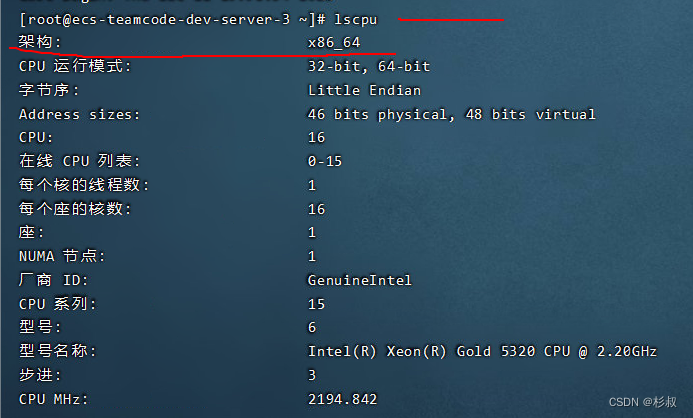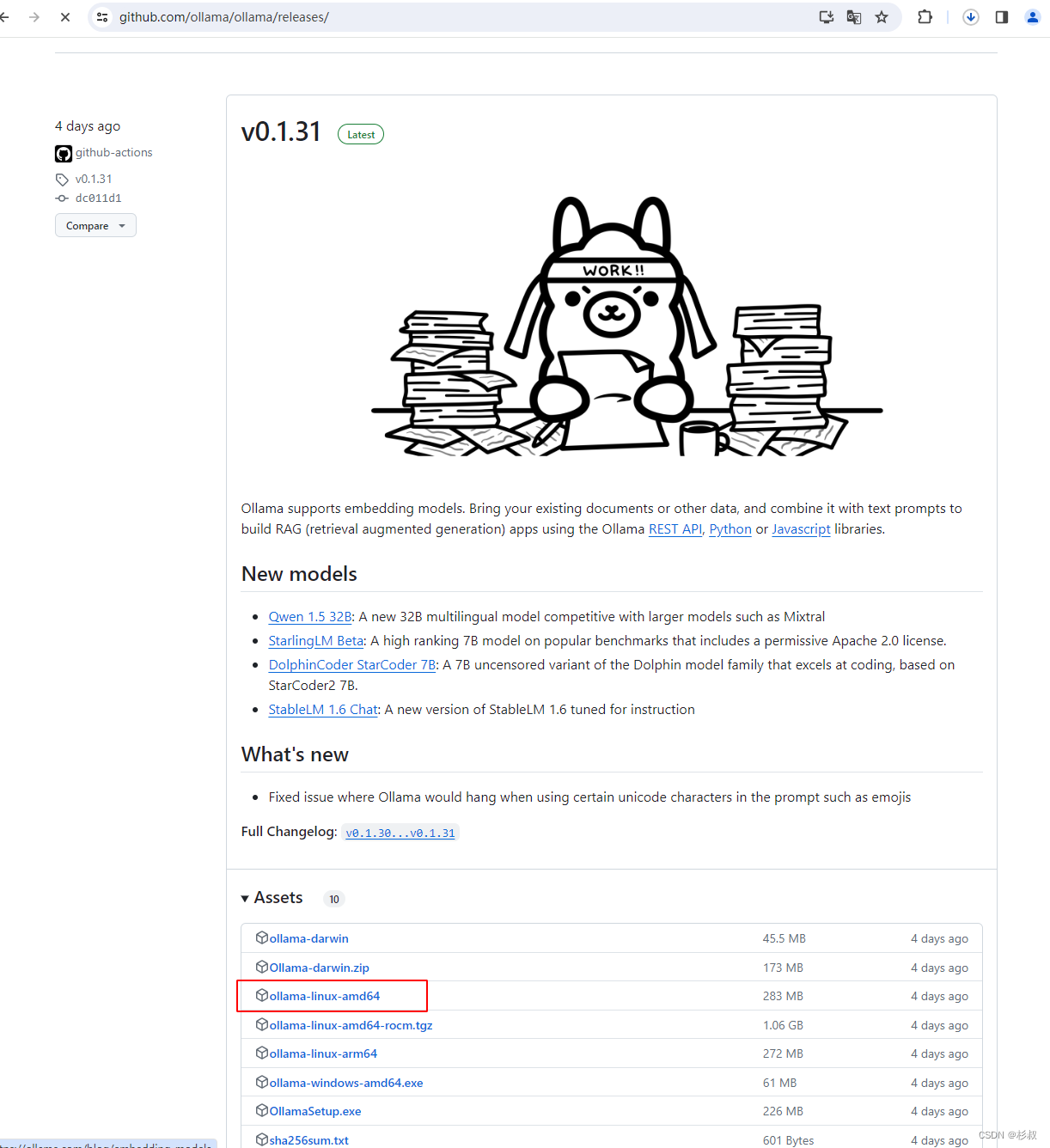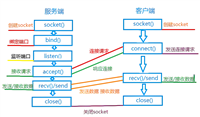1、在线安装
在线安装地址https://ollama.com/download选择服务器系统,按照步骤完成安装
2、离线安装
步骤1:查看服务器cpu的型号
## 查看linux系统cpu型号命令,我的服务器cpu型号是x86_64
lscpu

步骤2:根据cpu型号下载ollama安装包,并保存到/home/ollama目录
下载地址 https://github.com/ollama/ollama/releases/
# x86_64 cpu选择下载ollama-linux-amd64
# aarch64|arm64 cpu选择下载ollama-linux-arm64

步骤3:离线下载linux环境的ollama安装脚本,并保存到/home/ollama目录
## 下载地址1,浏览器中打开下面地址
https://ollama.com/install.sh
## 下载地址2
https://github.com/ollama/ollama/blob/main/scripts/install.sh
## 国内加速可访问https://gitee.com/ai-big-model/ollama/blob/main/scripts/install.sh
步骤4:修改install.sh脚本
总共需要修改两个点,第一:ollama下载地址;第二:ollama安装包存放目录
第一处修改,注释下载链接
status "downloading ollama..."
## 在install.sh的第65行
#curl --fail --show-error --location --progress-bar -o $temp_dir/ollama "https://ollama.com/download/ollama-linux-${arch}${ver_param}"
第二处修改,修改ollama安装目录
status "installing ollama to $bindir..."
$sudo install -o0 -g0 -m755 -d $bindir
## 在install.sh的第73行
#$sudo install -o0 -g0 -m755 $temp_dir/ollama $bindir/ollama
$sudo install -o0 -g0 -m755 ./ollama-linux-amd64 $bindir/ollama
修改后的install.sh文件,v0.1.31版本
#!/bin/sh
# this script installs ollama on linux.
# it detects the current operating system architecture and installs the appropriate version of ollama.
set -eu
status() { echo ">>> $*" >&2; }
error() { echo "error $*"; exit 1; }
warning() { echo "warning: $*"; }
temp_dir=$(mktemp -d)
cleanup() { rm -rf $temp_dir; }
trap cleanup exit
available() { command -v $1 >/dev/null; }
require() {
local missing=''
for tool in $*; do
if ! available $tool; then
missing="$missing $tool"
fi
done
echo $missing
}
[ "$(uname -s)" = "linux" ] || error 'this script is intended to run on linux only.'
arch=$(uname -m)
case "$arch" in
x86_64) arch="amd64" ;;
aarch64|arm64) arch="arm64" ;;
*) error "unsupported architecture: $arch" ;;
esac
kern=$(uname -r)
case "$kern" in
*icrosoft*wsl2 | *icrosoft*wsl2) ;;
*icrosoft) error "microsoft wsl1 is not currently supported. please upgrade to wsl2 with 'wsl --set-version <distro> 2'" ;;
*) ;;
esac
ver_param="${ollama_version:+?version=$ollama_version}"
sudo=
if [ "$(id -u)" -ne 0 ]; then
# running as root, no need for sudo
if ! available sudo; then
error "this script requires superuser permissions. please re-run as root."
fi
sudo="sudo"
fi
needs=$(require curl awk grep sed tee xargs)
if [ -n "$needs" ]; then
status "error: the following tools are required but missing:"
for need in $needs; do
echo " - $need"
done
exit 1
fi
status "downloading ollama..."
# curl --fail --show-error --location --progress-bar -o $temp_dir/ollama "https://ollama.com/download/ollama-linux-${arch}${ver_param}"
for bindir in /usr/local/bin /usr/bin /bin; do
echo $path | grep -q $bindir && break || continue
done
status "installing ollama to $bindir..."
$sudo install -o0 -g0 -m755 -d $bindir
# $sudo install -o0 -g0 -m755 $temp_dir/ollama $bindir/ollama
$sudo install -o0 -g0 -m755 ./ollama-linux-amd64 $bindir/ollama
install_success() {
status 'the ollama api is now available at 127.0.0.1:11434.'
status 'install complete. run "ollama" from the command line.'
}
trap install_success exit
# everything from this point onwards is optional.
configure_systemd() {
if ! id ollama >/dev/null 2>&1; then
status "creating ollama user..."
$sudo useradd -r -s /bin/false -u -m -d /usr/share/ollama ollama
fi
if getent group render >/dev/null 2>&1; then
status "adding ollama user to render group..."
$sudo usermod -a -g render ollama
fi
if getent group video >/dev/null 2>&1; then
status "adding ollama user to video group..."
$sudo usermod -a -g video ollama
fi
status "adding current user to ollama group..."
$sudo usermod -a -g ollama $(whoami)
status "creating ollama systemd service..."
cat <<eof | $sudo tee /etc/systemd/system/ollama.service >/dev/null
[unit]
description=ollama service
after=network-online.target
[service]
execstart=$bindir/ollama serve
user=ollama
group=ollama
restart=always
restartsec=3
environment="path=$path"
[install]
wantedby=default.target
eof
systemctl_running="$(systemctl is-system-running || true)"
case $systemctl_running in
running|degraded)
status "enabling and starting ollama service..."
$sudo systemctl daemon-reload
$sudo systemctl enable ollama
start_service() { $sudo systemctl restart ollama; }
trap start_service exit
;;
esac
}
if available systemctl; then
configure_systemd
fi
if ! available lspci && ! available lshw; then
warning "unable to detect nvidia/amd gpu. install lspci or lshw to automatically detect and install gpu dependencies."
exit 0
fi
check_gpu() {
# look for devices based on vendor id for nvidia and amd
case $1 in
lspci)
case $2 in
nvidia) available lspci && lspci -d '10de:' | grep -q 'nvidia' || return 1 ;;
amdgpu) available lspci && lspci -d '1002:' | grep -q 'amd' || return 1 ;;
esac ;;
lshw)
case $2 in
nvidia) available lshw && $sudo lshw -c display -numeric | grep -q 'vendor: .* \[10de\]' || return 1 ;;
amdgpu) available lshw && $sudo lshw -c display -numeric | grep -q 'vendor: .* \[1002\]' || return 1 ;;
esac ;;
nvidia-smi) available nvidia-smi || return 1 ;;
esac
}
if check_gpu nvidia-smi; then
status "nvidia gpu installed."
exit 0
fi
if ! check_gpu lspci nvidia && ! check_gpu lshw nvidia && ! check_gpu lspci amdgpu && ! check_gpu lshw amdgpu; then
install_success
warning "no nvidia/amd gpu detected. ollama will run in cpu-only mode."
exit 0
fi
if check_gpu lspci amdgpu || check_gpu lshw amdgpu; then
# look for pre-existing rocm v6 before downloading the dependencies
for search in "${hip_path:-''}" "${rocm_path:-''}" "/opt/rocm"; do
if [ -n "${search}" ] && [ -e "${search}/lib/libhipblas.so.2" ]; then
status "compatible amd gpu rocm library detected at ${search}"
install_success
exit 0
fi
done
status "downloading amd gpu dependencies..."
$sudo rm -rf /usr/share/ollama/lib
$sudo chmod o+x /usr/share/ollama
$sudo install -o ollama -g ollama -m 755 -d /usr/share/ollama/lib/rocm
curl --fail --show-error --location --progress-bar "https://ollama.com/download/ollama-linux-amd64-rocm.tgz${ver_param}" \
| $sudo tar zx --owner ollama --group ollama -c /usr/share/ollama/lib/rocm .
install_success
status "amd gpu dependencies installed."
exit 0
fi
# ref: https://docs.nvidia.com/cuda/cuda-installation-guide-linux/index.html#rhel-7-centos-7
# ref: https://docs.nvidia.com/cuda/cuda-installation-guide-linux/index.html#rhel-8-rocky-8
# ref: https://docs.nvidia.com/cuda/cuda-installation-guide-linux/index.html#rhel-9-rocky-9
# ref: https://docs.nvidia.com/cuda/cuda-installation-guide-linux/index.html#fedora
install_cuda_driver_yum() {
status 'installing nvidia repository...'
case $package_manager in
yum)
$sudo $package_manager -y install yum-utils
$sudo $package_manager-config-manager --add-repo https://developer.download.nvidia.com/compute/cuda/repos/$1$2/$(uname -m)/cuda-$1$2.repo
;;
dnf)
$sudo $package_manager config-manager --add-repo https://developer.download.nvidia.com/compute/cuda/repos/$1$2/$(uname -m)/cuda-$1$2.repo
;;
esac
case $1 in
rhel)
status 'installing epel repository...'
# epel is required for third-party dependencies such as dkms and libvdpau
$sudo $package_manager -y install https://dl.fedoraproject.org/pub/epel/epel-release-latest-$2.noarch.rpm || true
;;
esac
status 'installing cuda driver...'
if [ "$1" = 'centos' ] || [ "$1$2" = 'rhel7' ]; then
$sudo $package_manager -y install nvidia-driver-latest-dkms
fi
$sudo $package_manager -y install cuda-drivers
}
# ref: https://docs.nvidia.com/cuda/cuda-installation-guide-linux/index.html#ubuntu
# ref: https://docs.nvidia.com/cuda/cuda-installation-guide-linux/index.html#debian
install_cuda_driver_apt() {
status 'installing nvidia repository...'
curl -fssl -o $temp_dir/cuda-keyring.deb https://developer.download.nvidia.com/compute/cuda/repos/$1$2/$(uname -m)/cuda-keyring_1.1-1_all.deb
case $1 in
debian)
status 'enabling contrib sources...'
$sudo sed 's/main/contrib/' < /etc/apt/sources.list | $sudo tee /etc/apt/sources.list.d/contrib.list > /dev/null
if [ -f "/etc/apt/sources.list.d/debian.sources" ]; then
$sudo sed 's/main/contrib/' < /etc/apt/sources.list.d/debian.sources | $sudo tee /etc/apt/sources.list.d/contrib.sources > /dev/null
fi
;;
esac
status 'installing cuda driver...'
$sudo dpkg -i $temp_dir/cuda-keyring.deb
$sudo apt-get update
[ -n "$sudo" ] && sudo_e="$sudo -e" || sudo_e=
debian_frontend=noninteractive $sudo_e apt-get -y install cuda-drivers -q
}
if [ ! -f "/etc/os-release" ]; then
error "unknown distribution. skipping cuda installation."
fi
. /etc/os-release
os_name=$id
os_version=$version_id
package_manager=
for package_manager in dnf yum apt-get; do
if available $package_manager; then
break
fi
done
if [ -z "$package_manager" ]; then
error "unknown package manager. skipping cuda installation."
fi
if ! check_gpu nvidia-smi || [ -z "$(nvidia-smi | grep -o "cuda version: [0-9]*\.[0-9]*")" ]; then
case $os_name in
centos|rhel) install_cuda_driver_yum 'rhel' $(echo $os_version | cut -d '.' -f 1) ;;
rocky) install_cuda_driver_yum 'rhel' $(echo $os_version | cut -c1) ;;
fedora) [ $os_version -lt '37' ] && install_cuda_driver_yum $os_name $os_version || install_cuda_driver_yum $os_name '37';;
amzn) install_cuda_driver_yum 'fedora' '37' ;;
debian) install_cuda_driver_apt $os_name $os_version ;;
ubuntu) install_cuda_driver_apt $os_name $(echo $os_version | sed 's/\.//') ;;
*) exit ;;
esac
fi
if ! lsmod | grep -q nvidia; then
kernel_release="$(uname -r)"
case $os_name in
rocky) $sudo $package_manager -y install kernel-devel kernel-headers ;;
centos|rhel|amzn) $sudo $package_manager -y install kernel-devel-$kernel_release kernel-headers-$kernel_release ;;
fedora) $sudo $package_manager -y install kernel-devel-$kernel_release ;;
debian|ubuntu) $sudo apt-get -y install linux-headers-$kernel_release ;;
*) exit ;;
esac
nvidia_cuda_version=$($sudo dkms status | awk -f: '/added/ { print $1 }')
if [ -n "$nvidia_cuda_version" ]; then
$sudo dkms install $nvidia_cuda_version
fi
if lsmod | grep -q nouveau; then
status 'reboot to complete nvidia cuda driver install.'
exit 0
fi
$sudo modprobe nvidia
fi
status "nvidia cuda drivers installed."
步骤4:运行 install.sh脚本 ,安装
# 执行installl.sh脚本,需要sudo 权限 chmod +x install.sh
./install.sh
# 如果报错误权限不足,执行
chmod +x install.sh
# 如果报错误: bash: ./build_android.sh:/bin/sh^m:解释器错误: 没有那个文件或目录,执行
sed -i 's/\r$//' install.sh

步骤5:配置大模型下载目录
# 执行命令
vim ~/.bashrc
# 配置 ollama_models 环境变量自定义路径
### ollama model dir 改为自定义的路径,默认路径/usr/share/ollama/.ollama/models
export ollama_models=/home/ollama/ollama_cache
# 复制/usr/share/ollama/.ollama/models目录中(blobs manifests)的文件夹到ollama_models环境变量目录
cp -r /usr/share/ollama/.ollama/models /home/ollama/ollama_cache
步骤6:运行大模型,如通义千问
# 需要先将大模型下载到ollama_models文件中
# ollama run <模型名称>
ollama run qwen
步骤7:关闭 ollama 服务
# 关闭ollama服务
service ollama stop




发表评论